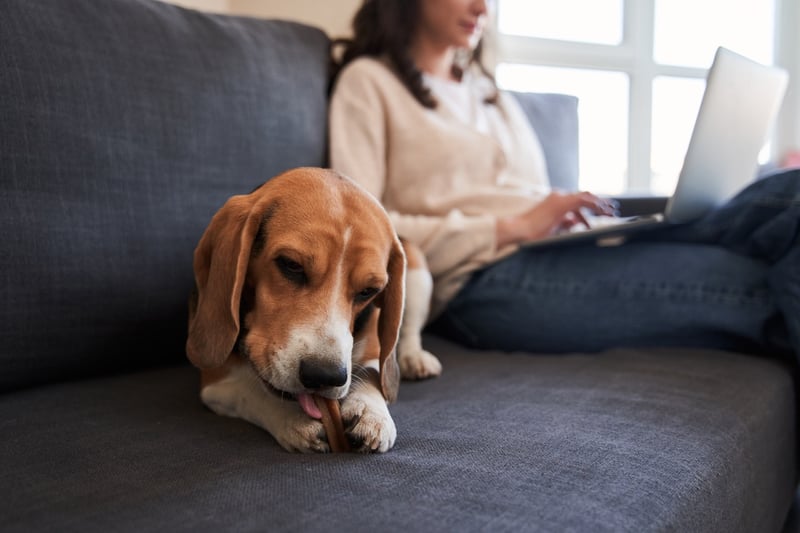Understanding why do dogs lick their paws is crucial for any dog owner. This behavior, though common, can stem from various issues ranging from simple grooming to more complex health concerns. In this blog post, we will delve deep into the reasons behind this intriguing behavior and explore when it might be time to take action.
Understanding Canine Paw Licking: A Comprehensive Guide
As a dog owner, it’s essential to understand that licking is a natural behavior for dogs. However, excessive licking can indicate underlying problems that need attention.
Licking serves multiple purposes for dogs. It allows them to groom themselves, soothe irritation, or even communicate emotions. While occasional paw licking is perfectly normal, persistent licking could point to a medical condition, anxiety, or boredom.
In this section, we’ll examine the various reasons behind dogs’ paw licking habits, helping you discern what’s normal and what might require intervention.
The Natural Instinct of Grooming
Dogs are natural groomers, and licking is an integral part of their self-care routine. Just like cats, dogs lick to keep their fur clean and free of debris.
When dogs lick their paws, they help remove dirt, pollen, and other irritants that might gather on their feet throughout the day. This instinctive behavior ensures they maintain their hygiene and health.
Moreover, the act of licking releases pheromones, which can make them feel more at ease. It’s similar to how a comforting touch can soothe humans.
Understanding this natural instinct helps clarify why your dog engages in this behavior — licking is simply part of their self-maintenance routine.
Emotional Expression Through Licking
Apart from grooming, licking can serve as a form of emotional expression for dogs. When they’re anxious, bored, or stressed, they may turn to licking as a coping mechanism.
For instance, some dogs may lick their paws when left alone for extended periods or during thunderstorms. This behavior helps them self-soothe and provides comfort.
Recognizing the emotional angle of why do dogs lick their paws can guide you in determining whether their behavior is purely physical or rooted in anxiety.
Identifying Abnormal Behavior
While licking is generally normal, there are times when it becomes excessive and concerning. If your dog seems to constantly lick their paws, it might be worthwhile to observe their behavior closely.
Changes in frequency, intensity, or even the specific areas being licked can provide clues. For example, if your dog is focusing only on one paw or has developed redness or swelling in the area, this could signal an underlying issue.
Attention to these details will allow you to better assess your dog’s behavioral changes and help identify potential problems requiring action.
Why is My Dog Obsessively Licking Their Paws?

Paw licking can turn obsessive for various reasons, both physical and psychological. Understanding these causes can empower you to take appropriate actions.
When you notice your dog obsessively licking their paws, it is essential to address the problem swiftly. Left unresolved, it could lead to further complications or discomfort for your pet.
Allergy-Related Causes
One of the most prevalent reasons for excessive paw licking is allergies. Dogs can suffer from environmental allergies, food sensitivities, and even flea infestations.
When exposed to allergens, dogs may experience itchy skin, leading them to lick their paws to relieve discomfort. Common allergens include grass, pollen, mold, and certain food ingredients.
If you suspect allergies might be the cause of your dog’s paw licking, consider consulting with a veterinarian for proper testing and treatment options. Early intervention can prevent significant skin irritations.
Skin Irritations and Infections
In addition to allergies, skin irritations and infections can lead to obsessive licking. Bacterial and fungal infections often develop in moist environments, such as between a dog’s toes.
These infections can cause itching, pain, and discomfort, prompting your dog to lick excessively. A professional examination can determine the presence of infections or other skin conditions that need treatment.
Observing other symptoms like redness, swelling, or discharge can also indicate the need for veterinary assistance.
Psychological Triggers
Psychological factors such as stress, anxiety, and boredom can also lead to compulsive licking behaviors. Dogs left alone for long periods may resort to licking as a way to cope with loneliness.
Similarly, dogs undergoing lifestyle changes, such as moving to a new home or experiencing a change in family dynamics, may lick their paws excessively due to stress.
In these circumstances, providing mental stimulation through toys, training, or social interactions can be beneficial in breaking the cycle of excessive licking.
Nighttime Paw Licking: Unraveling the Mystery Behind Your Dog’s Behavior

Many dog owners become concerned when they notice their pets licking their paws at night. Understanding the reasons behind this nocturnal behavior can help alleviate worries.
Nighttime licking can disrupt both your dog’s sleep and yours. Therefore, identifying the underlying causes is essential for restoring peace to the household.
Routine Changes and Sleep Disruptors
Your dog’s environment plays a significant role in their behavior. If recent changes have occurred—such as a new pet in the house or alterations in your schedule—it may affect your dog’s nighttime routine.
These changes can lead to anxiety and confusion, prompting your dog to lick their paws as a means of self-soothing. Establishing a consistent bedtime routine can help alleviate this behavior by providing a sense of stability.
Environmental Factors
Certain environmental factors can contribute to nighttime licking as well. For instance, exposure to indoor allergens like dust mites or mold can lead to discomfort, especially when lying down.
Furthermore, changes in temperature might cause discomfort, making your dog more prone to licking their paws in search of relief. Maintaining a clean, comfortable sleeping area can help minimize these triggers and reduce licking behavior.
Addressing Underlying Health Issues
Sometimes, nighttime paw licking can signify underlying health problems. If your dog exhibits excessive licking during the night while showing no signs of daytime distress, it’s worth investigating further.
Conditions like arthritis or muscle pain may become more pronounced in the evenings when the dog is less active. A visit to the vet can help ascertain whether your dog’s nighttime licking stems from a physical problem that requires treatment.
>> Awaken XT – Unveiling the Secrets of This Revolutionary Supplement for Enhanced Health
When Paw Licking Becomes a Problem: Recognizing Red Flags
Understanding when to worry about your dog’s paw licking is vital for ensuring their health and well-being.
While occasional licking is normal, there are specific red flags that indicate it may be time to seek professional help.
Signs of Infection or Irritation
If you notice swelling, redness, or a foul odor coming from your dog’s paws, it could be a sign of infection or irritation. These signs necessitate immediate veterinary consultation to prevent complications.
Persistent licking can create hot spots and exacerbate existing issues, so acting promptly is crucial.
Changes in Behavior
Pay attention to how your dog behaves in conjunction with their licking. If they seem lethargic, irritable, or withdrawn, this may indicate an underlying issue that needs addressing.
Behavioral changes often accompany physical health problems, so a holistic approach is necessary.
Duration and Frequency of Licking
If your dog is licking their paws continuously for several hours each day, this is considered excessive. This behavior can result in injury and should not be ignored.
Keeping track of your dog’s licking habits can help identify patterns, aiding in discussions with your veterinarian.
Decoding Your Dog’s Paw Licking: What Are They Trying to Tell You?
Your dog’s licking behavior can be a valuable communication tool. By observing their actions, you can decipher what they might be trying to convey.
Understanding these cues can deepen your bond with your pet and enable you to respond effectively to their needs.
Comfort and Security
Licking can represent a search for comfort and security. Dogs often lick themselves when seeking reassurance, much like humans might fidget or engage in self-soothing behaviors.
If your dog licks their paws after a stressful situation, it may be their way of coping and returning to a state of calm. Providing a safe environment can help ease their anxiety and reduce licking.
Seeking Attention
In some cases, licking can be a learned behavior aimed at getting attention from their owners. If your dog notices that licking results in a reaction from you—positive or negative—they may continue the behavior to solicit interaction.
If you suspect this is the case, redirecting their attention to a toy or engaging them in play can help shift their focus away from licking.
Physical Discomfort
Lastly, your dog may be trying to express physical discomfort through licking. Pain or itchiness in their paws can compel them to lick for relief.
Being attentive to their behavior can help you identify if the licking is a response to an injury or irritation. Regular check-ups with your veterinarian can ensure your dog remains healthy and free of discomfort.
Allergies and Paw Licking: A Common Connection
Allergies are among the top reasons dogs lick their paws. Understanding the connection between allergies and paw licking can help you manage your dog’s health effectively.
Like humans, dogs can be allergic to various substances, and recognizing the signs early can make all the difference.
Environmental Allergies
Dogs can develop allergies to many environmental elements, including pollen, grass, mold, and dust mites. These allergens can trigger an immune response, resulting in itching and discomfort.
When dogs lick their paws, they attempt to alleviate the irritation caused by these allergens. Keeping track of when and where your dog licks can help identify specific triggers.
Food Allergies
Food allergies are another common cause of paw licking. Certain ingredients, such as wheat, soy, or specific proteins, can lead to allergic reactions.
If you suspect food allergies may be causing your dog’s licking, consult your veterinarian about conducting elimination diets or allergy tests for accurate diagnosis.
Flea Allergies
Even a single flea bite can produce severe allergic reactions in susceptible dogs. Flea saliva can cause intense itching, prompting your dog to lick their paws excessively.
Ensuring your dog is on a regular flea prevention regimen can help mitigate this concern. Consult your veterinarian for suitable flea control products based on your dog’s specific needs.
Pain and Discomfort: Reasons Why Your Dog Might Be Licking Their Paws
Pain and discomfort are significant motivators for paw licking. Understanding how physical ailments manifest through licking can help you take prompt action.
As a dog owner, being vigilant about your dog’s overall behavior and health is crucial in identifying potential discomfort.
Arthritis and Joint Pain
Arthritis is a common condition that affects older dogs, causing joint pain and stiffness. As dogs experience discomfort in their limbs, they may lick their paws as a coping mechanism.
If your dog exhibits signs of limping or difficulty standing up, it would be wise to consult your veterinarian for assessment and management options.
Injuries or Wounds
Injuries to the paws, such as cuts, scrapes, or foreign objects lodged in between their toes, can cause significant discomfort. Your dog may lick the affected area to alleviate pain or irritation.
Regularly checking your dog’s paws can help identify injuries before they escalate into more serious issues. If you discover an injury, refrain from allowing them to lick excessively, as this may worsen the condition.
Neuropathic Pain
Neuropathic pain, resulting from nerve damage, may provoke unusual licking behaviors in some dogs. This type of pain can be challenging to diagnose but may indicate deeper health concerns.
If your dog appears to be experiencing chronic pain, reaching out to a veterinary specialist for evaluation can be crucial for their quality of life.
Behavioral Causes of Paw Licking: Anxiety and Boredom
Behavioral issues such as anxiety and boredom significantly contribute to paw licking. Understanding these factors can help you implement strategies to alleviate the root cause.
Addressing behavioral problems requires patience and commitment, but the results can enhance your dog’s well-being.
Separation Anxiety
Many dogs experience separation anxiety when left alone for long periods. This anxiety can manifest in various ways, including excessive licking.
Providing your dog with engaging toys, and puzzles to solve when you’re away, can offer distraction and alleviate feelings of loneliness. Gradually increasing the duration of your absences can also help them adjust to being alone.
Lack of Mental Stimulation
A bored dog is likely to find activities to occupy their time, and unfortunately, licking can become one of those habits. Without sufficient exercise and mental engagement, dogs may resort to repetitive behaviors like licking.
Engaging your dog in interactive play, training sessions, or introducing new toys can stimulate their minds and reduce boredom-related licking.
Stressors in the Environment
Environmental stressors like loud noises, changes in routine, or new household members can trigger anxiety in dogs. This heightened stress can lead to anxiety-driven licking behaviors.
Evaluating your dog’s environment for potential stressors and working to mitigate them can support their emotional well-being and curb excessive licking.
Effective Home Remedies to Stop Your Dog’s Excessive Paw Licking
Combatting excessive paw licking requires a multifaceted approach. Considering various home remedies can assist in alleviating the behavior while promoting your dog’s comfort.
Implementing these remedies may involve trial and error, but they can ultimately yield positive results for both you and your pet.
Creating a Calm Environment
One effective home remedy involves creating a calming environment. Consider utilizing soothing music or white noise machines to mask external sounds that might stress your dog.
Additionally, establishing a designated cozy space for your dog can encourage relaxation. Incorporating soft bedding, blankets, and safe chew toys can make their space inviting and secure.
Regular Grooming Routines
Establishing a routine grooming schedule can help maintain your dog’s cleanliness and reduce the likelihood of irritation. Regular bathing and brushing can eliminate allergens, dirt, and debris that accumulate on their paws.
Using hypoallergenic and vet-approved grooming products can also minimize the risk of adverse reactions while keeping your dog clean and comfortable.
Utilizing Bitter Tasting Sprays
If your dog is particularly stubborn about licking their paws, applying a bitter-tasting spray specifically designed for this purpose can deter the behavior.
These sprays can create an unpleasant taste, discouraging your dog from licking. However, ensure that the product is safe for canine use and consult your veterinarian for recommendations.
Seeking Professional Help: When to Consult a Veterinarian for Your Dog’s Paw Licking
While home remedies can be effective, some situations warrant professional intervention. Knowing when to consult your veterinarian is essential for ensuring your dog receives the care they need.
Recognizing the signs that indicate the need for veterinary consultation can prevent worsening health issues.
Persistent Licking Behavior
If your dog continues to lick their paws excessively despite implementing home remedies, seeking professional advice is a prudent step. Vet assessment can help identify underlying health issues that require intervention.
Signs of Infection or Injury
If you observe any signs of infection, injury, or inflammation accompanying your dog’s licking behavior, promptly contact your veterinarian. Timely treatment can prevent complications and promote faster healing.
Changes in Overall Behavior or Health
Any sudden changes in your dog’s behavior, appetite, energy levels, or overall health should not be overlooked. These changes can indicate underlying health concerns that need to be addressed by a professional.
Conclusion
Understanding why do dogs lick their paws is a multifaceted topic involving physical, emotional, and environmental considerations. Being attuned to your dog’s behavior and needs is crucial for identifying potential problems, ensuring proper care, and enhancing their overall well-being.
Whether the cause is simple grooming, allergies, or anxiety, addressing paw licking behavior promptly can aid in maintaining your dog’s health and happiness. By taking the time to understand your furry friend better, you can foster a stronger bond and create a more fulfilling life together.










